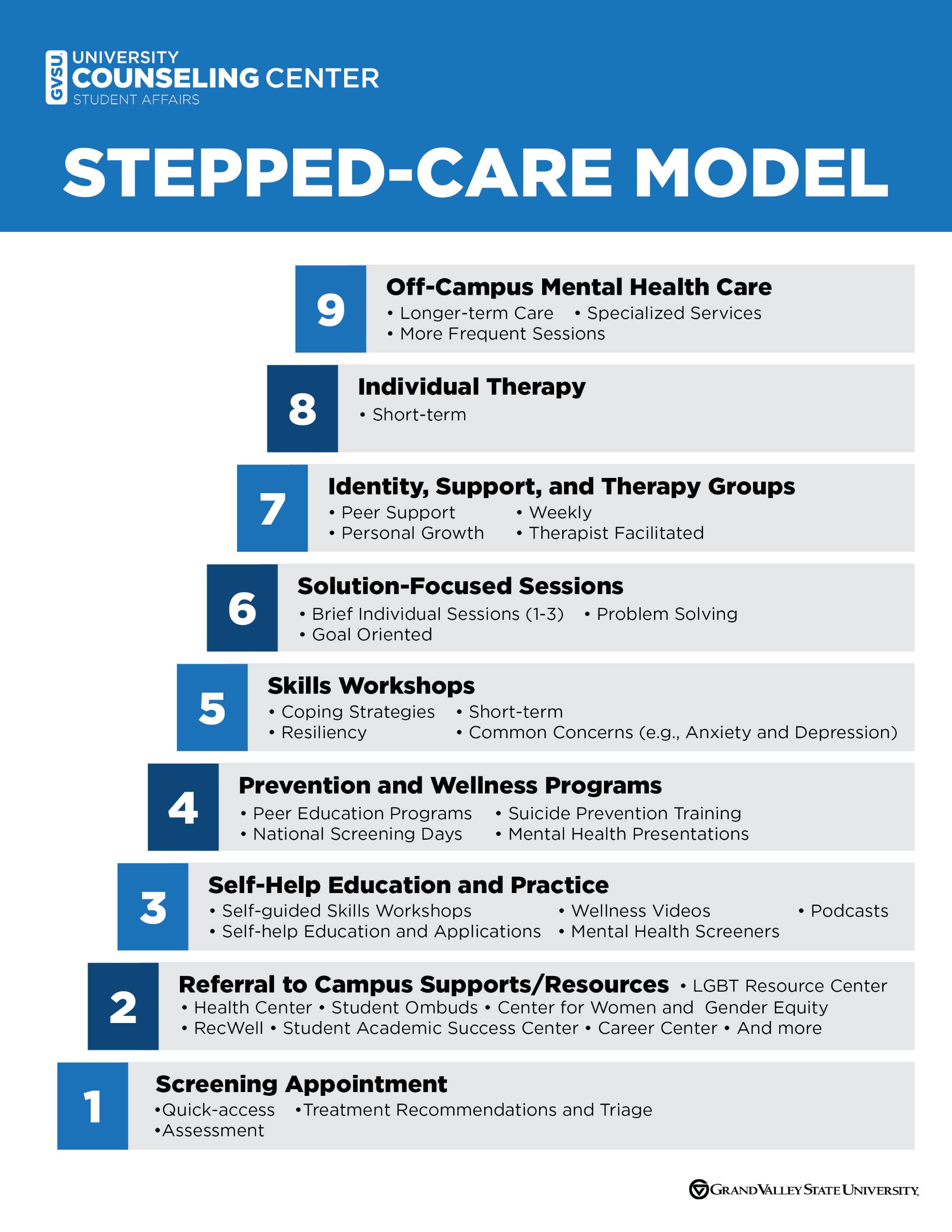Scope of Practice
The University Counseling Center (UCC) provides a range of short-term mental health services within a Stepped-Care Model to currently enrolled GVSU students. In order to provide clinical care that is responsible and appropriate for students, the Center evaluates each student’s needs and makes professional recommendations from a range of services both within the Center and in the community. The UCC generally meets the treatment needs of 85% of students seeking services, with most of these students completing their care on-campus. UCC clients attend an average of 5 to 6 individual/group therapy sessions per year.
The UCC staff is comprised of an interdisciplinary team of licensed mental health providers and advanced mental health trainees, who are supervised by licensed clinicians. Staff meet with students for an initial screening appointment to determine the level of care needed to address the student’s concern(s). UCC mental health providers use their professional judgment and a standardized symptom assessment tool to determine where along a continuum of care options a student may fall, and whether their needs are within the scope of clinical care offered at the UCC. Our goals are to identify the needs of our students and connect them to the appropriate services.
UCC Stepped Care Model
Stepped-Care is an effective and innovative approach to mental health treatment that incorporates a range of supports and services for individuals to work toward their goals and improve their wellness. A Stepped-Care Model does not assume that everyone who seeks support from the UCC needs to start with individual therapy. Rather, this model focuses on providing services that match an individual’s needs. This approach allows for targeted care, reduces wait-times, and increases available options to meet the needs of students. For example, psychoeducational skills groups have been a preferred choice of treatment for many students because they are offered weekly, are time-limited, have various start dates throughout the semester, and offer specific skills to manage symptoms. Furthermore, students who attend groups at the UCC often realize that they are not alone and experience peer support that helps to quickly improve their wellbeing.
Why the UCC May Refer Out
Some students’ needs or expectations may not fall within the Centers treatment model or scope of practice. When this occurs, staff assist students in getting connected to a community provider who can better meet their needs. Students and families may also utilize Thriving Campus to locate a provider in their area.
The following list includes common issues, needs, or requested services that require treatment from a community provider. This list is not exhaustive, as there may be other individual situations that necessitate a referral. Individuals or their families are welcome to consult with a staff member about whether our services may meet their needs or inquire about community resources.
- A need or request for weekly on-going individual counseling or several clinical services simultaneously.
- A specific clinically recommended treatment or a request for a treatment modality not provided within our center or scope of practice and training.
- Mandated treatment or assessment (example: ongoing legal case, court or legally required, departmental or employee requirement, fitness for duty, etc.)
- Students with a concern that cannot ethically be treated within our short-term individual therapy model and frequency of sessions (typically one session every two to three weeks).
- Evaluations for psychological testing, substance abuse, ADHD (including medication management), learning disabilities, fitness for duty, emotional support animals (including letters of support), and other accommodations.
- Students who are unable to adhere to UCC policies and/or treatment recommendations (violation of UCC attendance policies, lack of follow-through with clinical treatment recommendations, etc.)
- Students receiving on-going individual therapy with another provider (including forms of teletherapy).
- Students seeking psychotropic medication services only, medication for ADHD, or controlled substances.
- Students with a history of multiple inpatient hospitalizations.
- Students who utilize urgent and crisis services repeatedly and cannot be stabilized using a short-term therapy model.
- Referral needed due to the severity and the needed level of care for treating and stabilizing of a current condition (substance use, eating disorder, active suicidal or homicidal ideations, experiencing active psychosis, etc.).
Questions?
If you have questions about our services, scope of practice, or need information about community resources, please contact the University Counseling Center.
Phone: (616) 331-3266
Email: [email protected]


